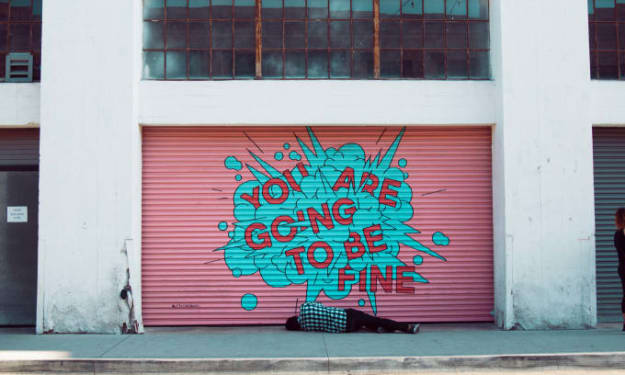Self-Image
When I look in the mirror, I can't see what others see, and here is my story.

Everywhere I go, people are always commenting on how I look, and that happens even if I have a day with no makeup, in pajamas, or dressed in my glad-rags. I don't have a problem with the person telling me these things, the problem I have is I can't see it. The other day I went makeup-less and dressed down and everyone said I looked good, but without my "smart look" I felt unconfident. However, if someone compliments me when I look smart, I still can't truly see it.
I'm very short, of average build, and I still have a "mummy tummy" that will never go completely flat because of my pelvic bone, which fractured during my pregnancy and caused severe issues after my C-section. In the past, my mental health problems were very severe, I lost a lot of weight, and when I was admitted to hospital, I was drastically underweight. I managed over the years to put some weight back on, but the shape of my tummy gets me every time, and I won't attempt to show it to anyone.
Let's talk about teeth. I used to have what people nicknamed a "Kylie Smile." That is, as people described it, "A really beautiful white wide smile." I am 42 years old now, some of my teeth are really damaged and no longer white. The truth is I can't find a dentist who can cope with my Post Traumatic Stress Disorder enough to help me through the operation I need to get them fixed, and I have a phobia of needles and a fear of being put to sleep because I almost passed away during my C-section to wake with hypothermia.
When I was young, I had been bullied all my young life, as well as most of my adult life. I was also raped, abused, and used like a toy and a punching bag by many different people. This went on for years, and although I have been outspoken about it and had the support, these mental scars have not really changed the way in which I physically see myself. I had to put up with names such as "worthless," "fat," "undatable," and "useless," and I was made to feel like I would never be able or capable of achieving anything in my life. People often told me that I was "un-pretty" on a regular basis, and when you have heard these words repeatedly for so long, your mind starts to believe them. I was even told by a person who I had an argument with recently that "No one would ever date me again if I was single because I'm not good to love." This really grated at me because before I got married, I already saw myself as "undatable," and when things get rocky, I get really worried about how I see myself in relationships. Also, when we breakup sometimes (as couples sometimes do), I find it hard to focus on myself because I'm constantly worrying about what others think of me.
In the media, there are many pictures of beautiful women who are often dressed up and look really glamorous. I used to think, "If I look like her/him then I will feel better." However, I did my research, and I was surprised, but motivated, to find that many of these people did not feel the way they looked underneath, and that a lot of the time they felt they were pressured to look a certain way. This made me think with horror at how much bad press I hear from members of the public with regards to how the media portrays people; however, some of these people revealed themselves without makeup and spoke out about what makes them uncomfortable. This helped me a little bit, and I'm looking into going back to achieve my singing dream, regardless of how I feel, because doing my passion is one thing I know will help me mentally even though it won't change the way I see myself physically.
"You look good in those clothes," "You look lovely with your hair down," "You have a nice body," and often because of my situation, "Your worth more" are also compliments I get, but each time I get them, I always find myself questioning whether these people are being honest with me because when I look in the mirror, I see frumpy, tired, messy, fat, worthless, unvalued me, and I can't really see anything beyond that—though I often try to do things to help me with it.
I love fitness; I'm not into a gym much because I'm a bit wary of working out with others, whether they are male or female. I do like long walks when my Post Traumatic Stress Disorder is not to a point where I can't get out, I love working out with my Wii (I do this through sports packages and Sports Resort is my favorite), football—but I was put off because no one around me wants to play and I've not played since school because I can't handle being on a football team, though I do like to dribble a ball and practice many techniques alone and I love watching it, even though I find that I have to fight to do so because I live with somebody who hates it—and dancing and singing are something I can do all night.
I often get told "Join a gym," "Go to a club" "Join a dancing class," but these things are out of my reach because my anxiety about the way I see myself and how others will is high, which is why I am waiting on a professional singing coach who can coach me on an individual basis. I haven't given up, I spend a lot of time practicing at home whether for fun or not, and singing along to my favorite singer for me is a confidence boost.
I have spoken to a lot of people about my perception of self. Where they see "thin," I see "fat." Where they see "talent," I see "stupid." Where they see "confidence," I see "anxiety." And where they see "pretty," I see "ugly." It isn't a cycle that anyone like me wants to be caught up in, it comes from years and years of abuse, both physically and psychologically, and events that made them feel bad about myself.
I am continuing to try and help myself, but my relationships and friendships often destruct. People ask me, "You're married? Aren't you supposed to be happy?" The truth is a person can fall in love and be married for a variety of reasons, but often, it is not enough to heal the severe permanent open scars that have been left behind years of trauma; marriage can't help with that. The only thing a person like me can do is keep trying and keep fighting to better oneself—and in some cases, like mine, the journey never really ends.
When I do look into the mirror—even if I am putting makeup on—to myself, the mirror is broken. What I mean is the reflection staring back at me does not really look like me. I could see a pretty reflection, but my perception of it is that is entirely somebody else, and I could not possibly look that pretty anyway. Many people tell me the same thing about themselves, but often, there is one difference: They know that at least a part of that reflection is them, but to me, not even a part of it could possibly be me. The mirror in my eyes tells tales, often reflecting back this vibrant, small, young looking woman who is just trying to look after herself. However, in my own mind, I'm this really terrible, messy, sour-faced person that everybody hates!
I'm not saying I'm always this negative about myself. Some days I can wake up and say I look "great" if I am happy. What I am saying is my mental health can often distort and dictate the way I am meant to look through my mind's eye for that day, so when I'm really low, I see a green slimy looking human being and convince myself that everyone else can see it too. However, when I'm happy, I don't see the "pretty" everyone tells me about, I just see "great!"
I think it comes down to mental distortion, and when we are recovering from a serious mental health problem, it is very easy for us to "distort" the way in which we see our true selves. For me, it is a regular occurrence, and when I go out, I really hate being looked at because it triggers that "why are you looking at me like that?" question, which is often followed by the "there is something wrong with me" thought.
In reality, there are plenty of us who are unsatisfied with the way in which we look or are perceived by others and by ourselves, however, mental health problems, especially trauma-related, can make this misperception much harder to deal with. I find on my worst day, no matter how many people compliment me, those compliments do not truly sink in. I have to deal with that by taking each day as it comes, and I have to do a lot of pushing away just to get through each day. When the end of the day comes, I am often so exhausted by my thinking, that it can be hard to sleep because my mind becomes overactive and obsessed with how I felt that day. Therapy doesn't always help for this issue, but playing with self-care, exercise, and focusing on what I want to do can work wonders.
My conclusion on this is, no matter what you do when you have a problem with self-image, neither you or others are going to convince you otherwise. People have tried since I was 18, and I am now 42 years old. In today's society, coupled with the pressure of mental health problems and combined with feeling so forced to look a certain way to a point where we forget who we are, the best thing we can do is try to be the best we can. Accept what we can about ourselves because otherwise, we will miss out on all the good things as we are continually focusing on the negative aspects of ourselves.
About the Creator
Carol Townend
Fiction, Horror, Sex, Love, Mental Health, Children's fiction and more. You'll find many stories in my profile. I don't believe in sticking with one Niche! I write, but I also read a lot too.






Comments
There are no comments for this story
Be the first to respond and start the conversation.